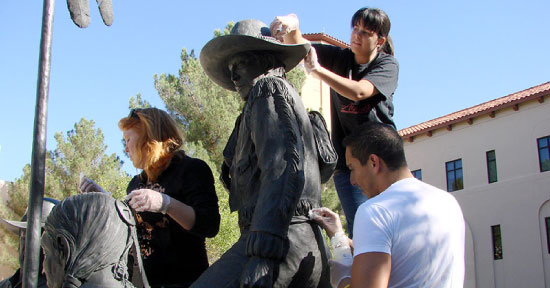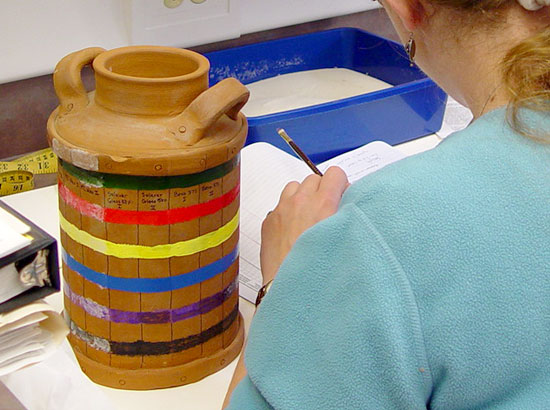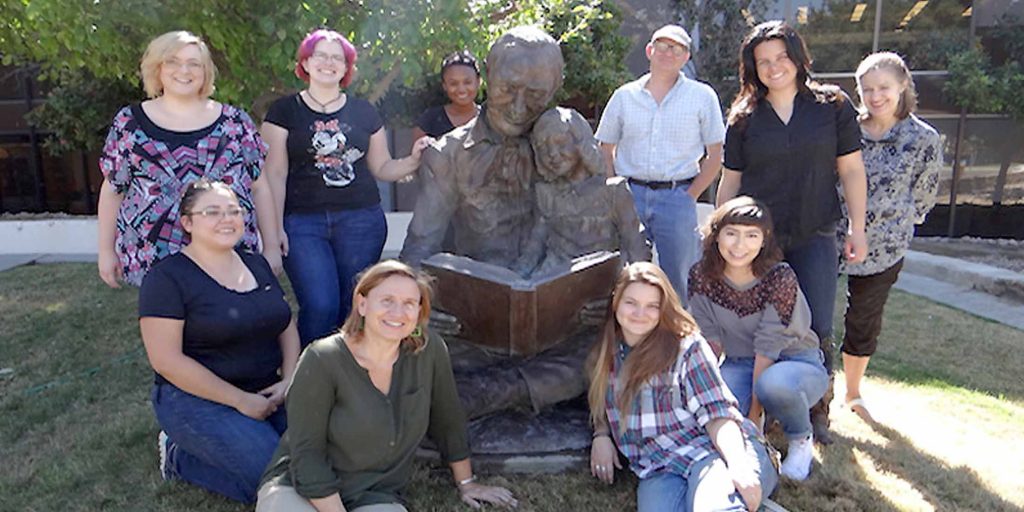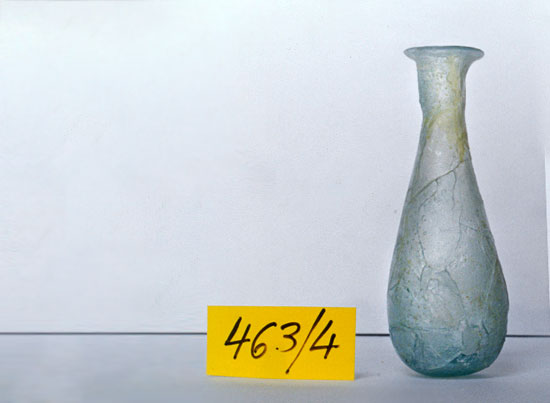WELCOME TO THE MUSEUM CONSERVATION PROGRAM
Programs offered:
UNDERGRADUATE
B.F.A Program in Museum Conservation
Minor in Museum Conservation
GRADUATE
Museum Studies Graduate Certificate
What is the Museum Conservation Program?
The Museum Conservation degree at NMSU seeks to prepare students in one of three ways:
- Student may complete a degree in Museum Conservation in order to work with art conservators in art galleries, museums, private collections and archaeological excavations with an understanding of conservation issues;
- Students may take courses in Museum Conservation to complement another degree (e.g., Anthropology, History, Biology, etc. including at the graduate level)
- After completing the Museum Conservation degree, some students may wish to apply to enter a graduate program to become an art conservator or continue in museum studies.
GRADUATE STUDENTS can also take the museum conservation courses at the graduate level as elective classes or as part of the MUSEUM STUDIES CERTIFICATE at NMSU, in order to learn curatorial work and collection managing with fundamentals in conservation and preservation.

What is Art Conservation?
Art conservators attempt to protect material objects of all types from further degradation. This requires not only a knowledge of studio art and conservation techniques, but also of the chemical, biological and physical factors that cause works of art to deteriorate.
What is Conservation? “Conservation encompasses actions taken toward the long-term preservation of cultural property. Conservation activities include examination, documentation, treatment, and preventative care, supported by research and education.” https://www.culturalheritage.org/
How to become a conservator? “There are many possible careers in conservation, spanning a range of preservation and conservation tasks. Today, more than two thirds of practicing conservators have a Master’s degree, and most job postings for conservators require a Masters degree in conservation or equivalent.” https://www.culturalheritage.org/about-conservation/become-a-conservator

BFA in MUSEUM CONSERVATION
Overview of Requirements
The BFA in Museum Conservation requires a total of 128 credits. In addition to the NMSU University General Education requirements (pp. 14-16, 2007-2008 NMSU Undergraduate Catalog) and the requirements of the college of Arts and Science (pp. 42-43), Museum Conservation majors must complete 79 required credits in:
Basic Sciences (Chemistry) (16 credits)
Museum Conservation (9 credits)
Studio Arts (15 credits)
Art History (18 credits)
Anthropology/History (15 credits)
Museum Studies (6 credits)
Credits : 16
For students going to graduate school in art conservation (16cr.):
CHEM 111G, CHEM 112G(8cr) or CHEM 115, CHEM 116 (8cr.)
Plus: CHEM 313, CHEM314, CHEM315 (Lab) (8cr.)
For students NOT going to graduate school in art conservation (16cr.):
CHEM 111G, CHEM 112G,CHEM 211 (12 credits)
Plus: one from either (4cr.):
BIOL 211G/ BIOL 211GL Cellular & Organismal Biology & Laboratory (4cr)
EPWS 303 Economic Entomology (4cr.)
(9 credits, 3 courses; all required)
ART 401, Museum Conservation Techniques I
ART 402, Museum Conservation Techniques II
ART 403, Preventative Conservation/Collections Care
Students who wish to gain more hands-on experience can take ART 499, Problems in Studio
All four of the above courses can also be taken for graduate credit at the 500-level.
(15 credits – 5 courses in STUDIO ART are required)
2 required courses (6cr.):
ART 250 – Introduction to Drawing and Painting (3cr.)
ART 260 –Introduction to Painting (3cr.)
Plus 3 electives (9cr.)
From either 200- level (or higher) Studio Art courses from different media areas
(18 credits)
ART 295 Introduction to Art History I (3 cr)
ART 296 Introduction to Art History II (3 cr)
ART 298 Writing in Art (3 cr)
Plus 3 ART HISTORY elective– 300 or higher level (9 cr)
(15 credits)
2 required courses, (6 cr.)
- ANTH 315 Intro to Archeology (3 cr, required), and
- One HISTORY course (3cr.) from among:
-
HIST 330V “Introduction to Religious Studies”; HIST 333 “Renaissance and Reformation”; HIST 334 “Art and Life in Renaissance Italy”; HIST 371 “Ancient Greece”; HIST 397 ”Introduction to Public History”; HIST 424 “History of Art, Thought and Literature”; HIST 438 “Antiquity and Modernity”; HIST 481 “Time Traveling Through New Mexico’s Past”, HIST 483 “Historic Preservation”; HIST 486 “Interpreting Historic Places for the Public”; HIST 484 “Historical Editing, Theory, and Practice”
-
Plus 3 electives from among (9 cr):
- ANTH 334 Anthropology of Art Traditions (3 cr), ANTH 414 The Archeology of Religion (3 cr) ANTH 313 Ancient Mexico (3 cr, every FALL)), ANTH 316 Archaeology of the American Southwest (3 cr), ANTH 467 Archaeology of the American Southwest (3 cr), ANTH 318 Historical Archaeology (3 cr), , ANTH 485 Field Experience, ANTH 497 Special Topics (if archaeology) ANTH 378 Int-Lab Methods- Archaeology (3 cr, not offered every year)
(6 credits)
ANTH 345. Introduction to Museum Studies 3 cr.
ART 490 Museum Conservation Internship (3cr)
MUSEUM CONSERVATION MINOR
An undergraduate minor in Museum Conservation requires the completion of 9 credits of the three 400-level museum conservation courses listed below, and 18 credits of the courses selected from one of the tracks listed below (Track 1, Track 2, or Track 3), for a total of 27 credits.

Museum Conservation courses:
ART 401 Museum Conservation Techniques I (3 cr) (Spring)
ART 402 Museum Conservation Techniques II (3 cr) (Fall)
ART 403 Preventive conservation – Collections Care (Directed Readings) (3cr)
18 ELECTIVE Credits
ART 490 Museum Conservation Internship
ART 499 Problems in Studio
Art History (all time periods)
Studio Art (if the student decides to take all Studio Art courses it has to be from different media areas)
18 ELECTIVE credits:
ART 490 Museum Conservation Internship
ANTH 315 Intro to Archæology (3 cr),
ANTH 414 The Archeology of Religion (3 cr)
ANTH 313 Ancient Mexico (3 cr, every FALL)),
ANTH 316 Archeology of the American Southwest (3 cr),
ANTH 318 Historical Archaeology (3 cr),
ANTH 334 Anthropology of Art Traditions (3 cr) ,
ANTH 485 Field Experience,
ANTH 378 Int-Lab Methods- Archaeology (3 cr, not offered every year)
18 ELECTIVE credits:
ART 490 Museum Conservation Internship
HIST 330V “Introduction to Religious Studies”
HIST 333 “Renaissance and Reformation”
HIST 334 “Art and Life in Renaissance Italy”
HIST 371 “Ancient Greece”
HIST 397 ”Introduction to Public History”
HIST 424 “History of Art, Thought and Literature”
HIST 438 “Antiquity and Modernity”
HIST 481 “Time Traveling Through New Mexico’s Past”
HIST 483 “Historic Preservation”
HIST 486 “Interpreting Historic Places for the Public”
HIST 484 “Historical Editing, Theory, and Practice”
MUSEUM STUDIES GRADUATE CERTIFICATE
Academic Departments Contributing to the Program: Anthropology, Art, History
Detailed Program of Study:
The Certificate in Museum Studies is a 3-semester (or one year + summer) program designed for individuals who want to enhance their understanding of museum work but do not need a master’s degree. Many of our students also complete a certificate in conjunction with a Master’s degree in Public History, History, Art History, Anthropology, Museum Conservation, or other disciplines. The Certificate requirements include 18 credits, 12 of which are required and 6 are selected from a list of controlled electives. If you wish to complete a graduate certificate, you must apply for admission to this non-degree program. Even if you already enrolled in a graduate program at NMSU, you will need to complete a separate application to be admitted to the certificate program. . Once you have been admitted to the program and have completed all of the necessary coursework, you will need to file a Completion of Graduate Certificate form to be awarded the certificate.

ANTH 545 Advanced Museology I (3 cr., every Fall)
ART 503 Preventative Conservation / Collections Care (3 cr., every semester)
HIST 594 Public History Seminar (3 cr., every Spring)
INTERNSHIP (credits from ANTH, ART, or HIST) (3 cr.)
ANTH 508 Native American Intersections and Museums (3 cr.)
ANTH 540 Cultural Resource Management (3 cr.)
ANTH 547 Museum Field Methods (3 cr.)
ANTH 548 Museums & Society (3 cr.)
ART 501 Museum Conservation Techniques I (3 cr., every Spring)
ART 502 Museum Conservation Techniques II (3 cr., every Fall)
ART 579 Graduate Seminar: Art Theory, Criticism, Historiography (3 cr.)
ART 587 Exhibition Studies (3 cr.)
HIST 579 Oral History (3 cr.)
HIST 581 Time Traveling Through New Mexico’s Past (3 cr.)
HIST 583 Advanced Historic Preservation (3 cr.)
HIST 586 Interpreting Historic Places for the Public (3 cr.)
Museum Conservation Student’s Achievements
As part of the requirements for admittance in graduate programs, students have to work in internships at other institutions. This is the list of institutions where the students have attended summer courses or internships, studied for a semester, and/or taken a post-baccalaureate year, got a job or have been admitted in a graduate program. Just to name a few, beginning with the most recent, these include:</p
- 2018 – Spring semester. Three spring graduates from the BFA in Museum Conservation program have been accepted into the handful of highly competitive master’s programs in Conservation and are beginning their coursework:
- New Mexico State Museum Conservation Program student, Elena Mars, got accepted at the Buffalo State University Conservation Graduate Program.
- A second NMSU Museum Conservation Program student, Sydney Schaffer, was accepted at Queen’s University for the Masters in Art Conservation.
- A third student, Brittany Wallace, was also accepted for the master’s in conservation at the University of Lincoln in UK.
- 2018 Josefina Maldonado – restoration of a set of Assyrian reliefs in northern Virginia as part of a Paid Pre-program internship in West Virginia with the National Park Service. (National Council for Preservation Education (NCPE), Academic Year 2019 Internshipswith theNational Park Service (NPS), the Department of the Interior (DOI),General Services Administration (GSA), and Department of Defense (DOD)). Summer 2014 Internship at the Smithsonian Institution, National Air and Space Museum .She was also selected for an interview for the Conservation Program in SUNY Buffalo . Currently working at the Smithsonian Institute, National Air and Space Museum. 2013 – Interning a whole summer at the Conservation Department of the Buffalo Bill Historical Center in Cody, (WY). Several months working for a painting’s conservator in Hawaii. 2010 Internship at the Library of Congress, in Washington D.C. and Internship at El Paso Museum of Historyand The Magoffin Home .
- 2018 to present – Brittany Porter is working as Museum Exhibits Technician at the Lincoln and Fort Stanton historic sites . 2015 – Museum Exhibits Technician at the Hubbard Museum of the American West, NM
- 2017 Summer – Elena Mars – went to New York City to work under the direction of John Saundersfor the restoration of the New York City’s Monuments Project . The monuments restored were the following: Mozart; Thomas Moore; Von Webber; Washington Irving; Ludwig Van Beethoven; Edvard Grieg, Alfred Lincoln Seligman, Harriet Tubman, Carl Schurz, Woman’s Health Protective Association, Lafayette and Washington, Brooklyn War, William Jay Gaynor, Abraham Lincoln, George Washington, Marquis de Lafayette, Independence Flagstaff, Slocum Disaster, Temperance Fountain, Samuel Sullivan Cox, Dvorak, Stuyvesant, Giuseppe Garibaldi, and the Washington Square Arch.
- 2017 Summer – Brittany Wallace – went to Elvas (Minas Gerais), Brazil to work under the supervision of conservator Carlos Magno de Arau join his conservation studio where she restored a 15th to16th French paper-mache life size image of Christ. Magno is a well-known Brazilian conservator especially in the area of São João del Rei.
- 2017 Summer – Hailey Jung – went to the Anchorage Museum in Alaska where she worked with the Native American collections as part of her research for her Museum Studies thesis.
- 2015 – present , Barbara Bogucki accepted the position of curator at the Tahoe Maritime Museum where she serves as historian, collection manager and exhibition developer. She also gave back to the community by serving as adjunct faculty at the Fallon, Nevada Naval Base for two semesters and will continue to pursue opportunities to teach in higher education.
- 2013 – Kate Moorehead – curator at the Buffalo Gap Historic Village, Abilene, TX .
- 2013 – Chantel Baker – internship at the El Paso Museum of Art
- 2013 – Joanna Deardruff – Studying a Master’s Degree in Museum Studies, University of Bristol, England
- 2013 Danny Stephens – curator at the Magoffin Historic House, El Paso
- 2013 Norma Hartell – working at the Border Book Festival, Inc . in Las Cruces.
- 2013 Ereka Prevot – A whole year studying at the Leiden University in the Netherlands through the International Student Exchange Program(ISEP). She also did an internship at the University Museum.
- 2013 Cassandra Canada – Summer Internship at the Smithsonian Institution, National Air and Space Museum . She also attended in Baltimore, as an invitation from the Smithsonian, The Annual Meeting and Museum Expo by the American Alliance of Museums .
- 2013 Whitney Jacobs –2 internships at 2 Los Angeles (CA)Museums: Anthropology Department of the San Bernardino County Museum(SBCM) , and the Gilb Museum of Arcadia Heritage . She also attended a volunteer orientation at the Natural History Museum. In 2014. Whitney Jacobs graduated from the NMSU Museum Conservation Program in Fall 2013 and is one of two Americans to be accepted in the next cohort of the Erasmus Mundus Master’s Program ( European Community Action Scheme for the Mobility of University Students) . She was one of only 25 non-European students accepted this year and the only one who won the scholarship. Jacobs studied a Masters in Archaeological Materials Science for the Study and Conservation of Cultural Heritage Materials. She graduated in 2016. The Erasmus Program, one of the most prestigious programs in the world, was created by the European Union (EU) in 1987 to foster educational exchanges within the EU. The Erasmus Mundus program is open to non-Europeans. Jacobs spent two years in Europe while attending three universities: The Universidade de Évora (Portugal), Sapienza Universitadi Roma (Rome, Italy) and Aristotle University of Thessaloniki (Greece). She was also accepted at the University of Lincoln, UK, for the MA Conservation of Historic Objects .
- 2013 Lyndy Bush – Internship at the Smithsonian Institute, National Museum of Natural History (Botany Department). Restoring their 1,000 herbarium specimens that are dried on paper. They have water damage after hurricane Sandy and they are molding. She worked under a paper conservator. The Smithsonian will hire her for this job if they get a grant. She was also awarded $1,500 from the Stockman Scholarship. 2012 –Internship at the Museum of Nature and Sciencein Las Cruces restoring dinosaur tracks. Currently working with the large Japanese collection (over 3,000 items) donated to the city of Las Cruces. Cataloguing and organizing the collection. Currently working as Conservator Technician at Colorado Art Restoration in Dallas, CO.
- 2013 – Diana Campuzano , internship at the Farm and Ranch Museum , Las Cruces, NM
- 2013 – Joanna Deardruff – Studying a Master’s Degree in Museum Studies, University of Bristol, England 2013 – Stephanie Hawkins – Studying and working at Arizona State Museum
- 2013 – Danny Stephens – working at the Magoffin Historic House , El Paso, as a curator
- 2013 – Kate Moorehead – working at Buffalo Gap Historic Village, Abilene, TX . As a curator.
- 2012 to Present – Capri Price – Currently working as Teaching & Research Assistant at Portland University, (OR), 2011- Lab Intern. 2011 – Georgia O’Keefe Museum , worked as technical conservator. Fall semester 2011: Internship with a Material Science/Conservation Science Lab in Portland University, (OR). Master’s degree and a PhD in Conservation Science in Portland University, OR. Summer at SACI, Florence (Italy )for a Joint Summer School experience. The other universities were Maryland Institute College of Art(MICA) and Florida State University (FSU). 2010 – She worked for a conservation project at J.P.Taylor Monument in Mesilla, NM and at NMSU Kent Hall Museum. She took an online class “ Archeology of Pompeii (Italy): Preservation and Archeology” by Oxford University(UK) .
- 2012 Dyanna Morkun – works at the Glen Foerdon the Delaware Historic Home (the last surviving riverfront estate in Philadelphia)as a Collections and Program Coordinatorr
- 2011 – Annette Rosillo – worked at the Border Patrol Museum,El Paso (TX). Studying at the History Graduate Program at Sam Houston State University, in Huntsville, (TX).
- 2011 – Samantha Womack – Interned at the Archaeological Research Instituteat Arizona State University . Researched and installed a Hohokam red-on-buff exhibit. She worked at the Institute of Historical Survey Foundation cataloguing and curating an exhibition on “Gaudy” Carnival Glass.
- 2011 – Christina Garton – A ssistant editor Handwoven Magazine .
- 2011- Peter Dean – after graduation worked at the National World War One Museum in Kansas City, (MO). Currently working at the Wickenburg Museum, (AZ)
- 2011 Hilary Dutcher – internship at the Amerind Foundationin Dragoon, (AZ).
Check the requirements in each department
Links of Interest
To learn more about the need for trained professionals to work in the area of museum conservation go to: Museum Artifacts In Danger
Join the “NMSU Museum Conservation Students” group on FACEBOOK !!!
Check the new blog “ Emerging Conservation Professionals Network ” which is a forum for professionals that just entered the field of conservation or for students trying to get to graduate schools in conservation.
AIC (American Institute of Conservation of Historic and Artistic Works)